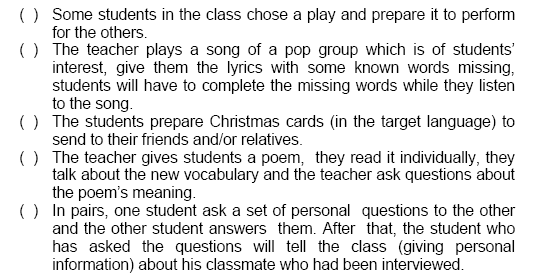Questões de Língua Inglesa da Fundação de Estudos Superiores de administração e Gerência (ESAG)
Lista completa de Questões de Língua Inglesa da Fundação de Estudos Superiores de administração e Gerência (ESAG) para resolução totalmente grátis. Selecione os assuntos no filtro de questões e comece a resolver exercícios.
Língua Inglesa - Interpretação de Texto - Fundação de Estudos Superiores de administração e Gerência (ESAG) - 2003
Some of the teacher's roles in an interactive teaching mode classroom are:
- A.
Listening student's opinions about the contents, choosing and preparing classes according to what they want to learn.
- B.
Preparing FL classes and choosing memorization and fixation activities.
- C.
Mediating the teaching/learning process and creating learning opportunities for students to use the target language.
- D.
Listening student's problems and advertising them about the best ways for studying.
Língua Inglesa - Interpretação de Texto - Fundação de Estudos Superiores de administração e Gerência (ESAG) - 2003
Evaluation has to be seen as a process practice. The teacher has to pay attention to each student's learning development in every class, not only on exams and tests. This mode of evaluating is called:
- A. Objective evaluation.
- B. Diagnostic evaluation
- C. Pedagogical evaluation.
- D. Whole evaluation.
Língua Inglesa - Interpretação de Texto - Fundação de Estudos Superiores de administração e Gerência (ESAG) - 2003
Write (1) for examples of oral practice activities, (2) for listening comprehension activities, (3) for reading activities and (4) for writing practice activities.

- A.
2, 3, 1, 1, 4.
- B.
2, 4, 1, 3, 2.
- C.
1, 2, 4, 3, 1.
- D.
4, 2, 1, 2, 3.
Língua Inglesa - Interpretação de Texto - Fundação de Estudos Superiores de administração e Gerência (ESAG) - 2003
About the textbook it is correct to say that:

- A.
Only alternative II is correct.
- B.
Only the alternatives I and III are correct.
- C.
Only the alternatives II, III and IV are correct.
- D.
All the alternatives are correct.
Língua Inglesa - Interpretação de Texto - Fundação de Estudos Superiores de administração e Gerência (ESAG) - 2003
Talking about the new vocabulary, discussing about the subject, and discussing about the pictures which are shown are examples of:
- A.
Grammar activities.
- B.
Listening comprehension activities.
- C.
Pre-reading activities.
- D.
Testing.
Língua Inglesa - Interpretação de Texto - Fundação de Estudos Superiores de administração e Gerência (ESAG) - 2003
Speaking and writing are language practices characterized by being:
- A.
Practices of grammar.
- B.
Practices of comprehension.
- C.
Practices of sports.
- D.
Practices of production.
Língua Inglesa - Interpretação de Texto - Fundação de Estudos Superiores de administração e Gerência (ESAG) - 2003
The Audio-lingual method was introduced in Brazil about 1971 with the technical teaching. It gives more importance to the language form and structure. It is based on the behaviorist psychology and the language teaching follows the sequence:
- A.
Listening, speaking, reading and writing.
- B.
Reading, speaking, listening and writing.
- C.
Speaking, listening, writing and reading.
- D.
Reading, writing, speaking and listening.
Língua Inglesa - Interpretação de Texto - Fundação de Estudos Superiores de administração e Gerência (ESAG) - 2003
About interdisciplinary teaching is WRONG to say that:
- A.
Interdisciplinarity demands a new pedagogy: the communication pedagogy.
- B.
Interdisciplinarity demands a reciprocal and mutual attitude.
- C.
It is a kind of substitution from a fragmentary conception to an unitary conception of the human being.
- D.
It's not feasible to teach a foreign language through an interdisciplinary way.
Língua Inglesa - Interpretação de Texto - Fundação de Estudos Superiores de administração e Gerência (ESAG) - 2003
Learning a foreign language develops some important learning strategies for student's thinking and acquisition of systemized knowledge. These are memorization, cognitive and compensation strategies and they are important for:
- A.
Developing learning through scholar activities; developing student's confidence in learning a foreign language; producing and organizing thinking; respectively.
- B.
Storing verbal material and using it whenever it is needed; using and transforming the target language; and overcoming student's knowledge limits in all abilities, respectively.
- C.
Memorizing structures and vocabulary; learning all the abilities by repetition and deduction; transforming and negotiating the meaning of the target language, respectively.
- D.
Using and transforming the target language; helping students to appropriate knowledge from other cultures; developing grammar principles through inductive methods.
Língua Inglesa - Interpretação de Texto - Fundação de Estudos Superiores de administração e Gerência (ESAG) - 2003
Besides the learning strategies discussed in the former question, learning a foreign language also develops important aspects of students' personality. The aspect which has nothing to do with students' personality is:
- A. Self-confidence
- B. Deduction
- C. Affective control.
- D. Self-esteem.


